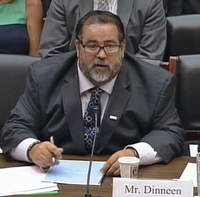Today, the Renewable Fuels Association (RFA) touted the flexibility of the Renewable Fuel Standard (RFS) while responding to the last in a five part series of whitepaper questions posed by the House of Representatives’ Energy and Commerce Committee. The last whitepaper examines “implementation issues” of the RFS.
Questions answered by RFA in the paper include:
Does EPA’s annual (Renewable Volume Obligation) setting process work well or are there concerns?
Are the cellulosic biofuel provisions in the RFS working well or do they need to be changed?
How can EPA improve its enforcement of the RIN credit trading program?
What is responsible for the rise in ethanol RIN prices in 2013?
Are increases in RIN prices likely to affect the production or marketing of renewable fuels?
 RFA president and CEO Bob Dinneen touched on most of these issues during his testimony to the committee this week. “Congress did an excellent job crafting the RFS and building in a great deal of administrative and market flexibility,” he said. “There’s nothing wrong with the RFS that can’t be fixed by what is right with the RFS.”
RFA president and CEO Bob Dinneen touched on most of these issues during his testimony to the committee this week. “Congress did an excellent job crafting the RFS and building in a great deal of administrative and market flexibility,” he said. “There’s nothing wrong with the RFS that can’t be fixed by what is right with the RFS.”
On the subject of RINS (Renewable Indentification Numbers), Dinneen had this to say. “RINS are free!” he said. “Ethanol producers are required to give RINS to refiners and gasoline marketers when they purchase a gallon of ethanol. Buy a gallon of ethanol, get a RIN for free.”
Listen to Dinneen’s opening remarks here: Bob Dinneen RFS testimony

